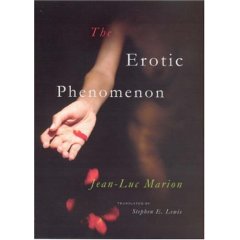 The word "philosophy "means "love of wisdom," but the absence of love from philosophical discourse is curiously glaring. So where did the love go? In The Erotic Phenomenon, leading postmetaphysical philosopher and Catholic thinker Jean-Luc Marion asks this fundamental question about his own discipline, while reviving inquiry into the concept of love itself. Marion begins with a critique of Descartes' equation of the ego's ability to doubt with the certainty that one exists -"I think therefore I am" - arguing that this is worse than vain. We encounter love, he says, when we first step forward as a lover: I love therefore I am, and my love (regard for the other) is the reason I care whether I exist or not. Marion then probes several manifestations of love and its variations, including carnal excitement, self-hate, lying and perversion, fidelity, the generation of children, and the love of God. Throughout, he stresses that all erotic phenomena, including sentimentality, pornography, and even boasts about one's sexual conquests, stem not from the ego as popularly understood but instead from love in its various guises. {edited description}
The word "philosophy "means "love of wisdom," but the absence of love from philosophical discourse is curiously glaring. So where did the love go? In The Erotic Phenomenon, leading postmetaphysical philosopher and Catholic thinker Jean-Luc Marion asks this fundamental question about his own discipline, while reviving inquiry into the concept of love itself. Marion begins with a critique of Descartes' equation of the ego's ability to doubt with the certainty that one exists -"I think therefore I am" - arguing that this is worse than vain. We encounter love, he says, when we first step forward as a lover: I love therefore I am, and my love (regard for the other) is the reason I care whether I exist or not. Marion then probes several manifestations of love and its variations, including carnal excitement, self-hate, lying and perversion, fidelity, the generation of children, and the love of God. Throughout, he stresses that all erotic phenomena, including sentimentality, pornography, and even boasts about one's sexual conquests, stem not from the ego as popularly understood but instead from love in its various guises. {edited description}Jean Luc Marion is currently the John Nuveen Professor of the Philosophy of Religion and Theology at the University of Chicago Divinity School. He is also in the Department of Philosophy and the Committee on Social Thought at the same university. His other books include the ground-breaking God Without Being (University of Chicago Press, 1991). Also Reduction and Givenness: Investigations of Husserl, Heidegger and Phenomenology (Northwestern University Press, 1998); Being Given: Toward a Phenomenology of Givenness (Stanford University Press, 2002); In Excess: Studies of Saturated Phenomena (Fordham University Press, 2002) and Descartes' Grey Ontology: Cartesian Science and Aristotelian Thought in the Regulae (St Augustine's Press, 2006). See also on this blog.
Comment on this post: FaithInSociety

No comments:
Post a Comment